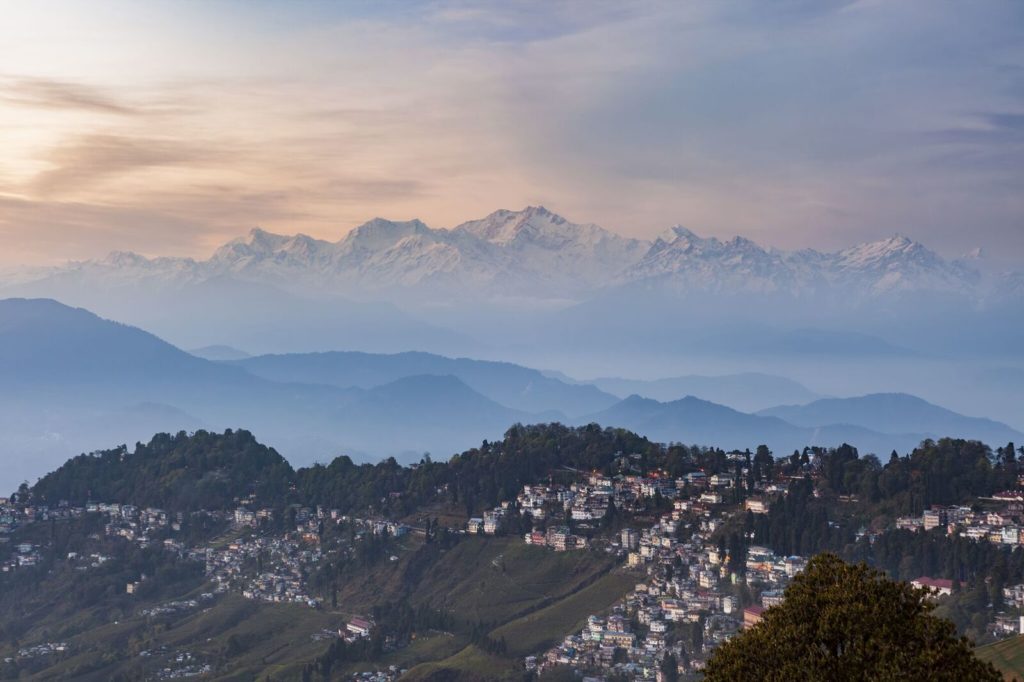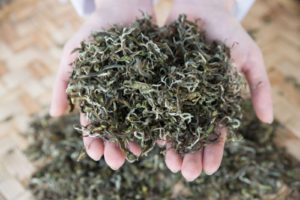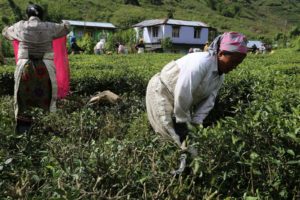
Improved taste
Tea made from a small-scale winter plucking suggests the plants benefitted as they lay idle. In December Makaibari Tea Estate, the oldest in Darjeeling, processed 10 kilos of "Yule Flush" as the last tea of the 2017 harvest. The tea was widely praised and hints at an outstanding flush. The certified organic, biodynamic tea sold for INRs19,363 ($302) per kilo to a Japanese buyer. Anupa Mueller, founder of Eco-Prima and a buyer of Makaibari and other teas describes a good first flush: "The first flush yields a sharp, clear, slightly astringent tea with a pine note. Tasters describe a greener tea that is light gold than the more widely available second flush.” Second-flush Darjeeling yields a light-colored, medium body amber liquor with a floral aroma and a musky spiciness labeled muscatel. Tasters describe a brisk, flowery, round, mellow, and sparkling tea that connoisseurs crave, she said. “The winey note is more associated with the second flush,” she said. Rajiv Lochan, the principal at Lochan Tea Limited, explains that the "new teas are better this year than in past years. Physiological and chemical reactions did such complex wonders to the tea bush because of the long rest period. We are expecting wonderful teas," says Lochan, a veteran planter in Darjeeling. "The weather god also played its part with Darjeeling Hills witnessing a spell of deep chill this winter with minimum temperatures descending much below the usual level in many places. The hills also witnessed rain during January, which experts say is best for the teas," he said. Yields should return to previous levels according to K. Mintri, a veteran planter and chairman of the Terai Indian Planters Association. He told the Economic Times "We are expecting favorable output right at the onset as overall monsoon remained in our favour."Pricing
 Sellers negotiating private deals are always hesitant to disclose exact prices but a combination of pent-up demand and assurances that the harvest will proceed unhindered by disgruntled workers has restored a sense of business-as-usual in the Darjeeling hills.
Barring labor unrest, it does not appear wholesale prices will be out of line from past years. Darjeeling (DJ1) ranges in price from $60 to $200 per kilo. Labor disruptions from June through September were a setback but did not bankrupt gardens. Currency fluctuations are a minor factor. Tea for export is priced in US dollars which fell 10 percent in 2017 on a trade weighted basis. India rupees now trade at INRs 65 per $1.
Nathmulls, a specialty retailer in Darjeeling, has been selling first-flush teas since 1931. This year's spring specialty Darjeeling (first flush) is priced from $33.50 per 100 grams ($3.35 per gram). The company website lists a wild spring Darjeeling white tea (first flush) priced at $32.50 per 100 grams ($3.25 per gram). Purchasing 500 grams reduces the cost to around $3 per gram. This makes the retail per kilo rate $300 (INRs 20,000). Retailers markup the wholesale price of tea by at least 150 percent, and more typically 200 percent for early teas.
Nathmulls described a "fine, very early first flush" from Glenburn Tea Estate as "possessing a refreshing flavor aroma
of spring flowers with mild fruitiness and slight vegetal notes." Another "slightly astringent" white tea with "rich fruity notes and a mildly sweet finish" was a first flush processed at the Rohini Tea Estate.
Here is a sampling of typical wholesale prices for this year's first flush:
Sellers negotiating private deals are always hesitant to disclose exact prices but a combination of pent-up demand and assurances that the harvest will proceed unhindered by disgruntled workers has restored a sense of business-as-usual in the Darjeeling hills.
Barring labor unrest, it does not appear wholesale prices will be out of line from past years. Darjeeling (DJ1) ranges in price from $60 to $200 per kilo. Labor disruptions from June through September were a setback but did not bankrupt gardens. Currency fluctuations are a minor factor. Tea for export is priced in US dollars which fell 10 percent in 2017 on a trade weighted basis. India rupees now trade at INRs 65 per $1.
Nathmulls, a specialty retailer in Darjeeling, has been selling first-flush teas since 1931. This year's spring specialty Darjeeling (first flush) is priced from $33.50 per 100 grams ($3.35 per gram). The company website lists a wild spring Darjeeling white tea (first flush) priced at $32.50 per 100 grams ($3.25 per gram). Purchasing 500 grams reduces the cost to around $3 per gram. This makes the retail per kilo rate $300 (INRs 20,000). Retailers markup the wholesale price of tea by at least 150 percent, and more typically 200 percent for early teas.
Nathmulls described a "fine, very early first flush" from Glenburn Tea Estate as "possessing a refreshing flavor aroma
of spring flowers with mild fruitiness and slight vegetal notes." Another "slightly astringent" white tea with "rich fruity notes and a mildly sweet finish" was a first flush processed at the Rohini Tea Estate.
Here is a sampling of typical wholesale prices for this year's first flush:
- Jungpana Spring Delight - $250/kg
- Rohini Jethi Kupi - $180/kg
- Glenburn Moonshine - $170/kg
- Selim Hill FTGFOP1 - $145/kg
- Giddapahar SFTGFOP1 - $125/kg
- Goomtee Spring oolong - $120/kg
- Glenburn Moonshine White: INRs3,099 $47.50/100 grams
- Goomtee Musctel Black: INRs2,499 $38.50/100 grams
Supply chain concern

Retail advice
Disruptions to the normal supply chain followed last year's first flush. It was the loss of second flush teas that forced retailers to seek alternatives. To meet demand, buyers sought teas from Nepal and Sri Lanka. Nepal's CTC (cut, tea, curl) replaced Darjeeling CTC at auction by late summer. "Manufacturers and other authorities haven’t yet realised the risk this has posed," according to Vivek Lochan. Some pre-first flush teas are available now but these are from the quicker-to-warm lower altitude gardens (under 300 meters) and those that rush production simply to be first to market during a time when stocks are depleted globally. The result is often a thin, unbalanced tea boosted by chemicals and sometimes forced by irrigation. Seasoned buyers avoid tea plucked "just for early's sake." Forced plucking yields a light tea that does not last. "The first crop of every year is always expensive and sales are good because quantities are low and people are hungry after the winter break," writes Vivek Lochan. "It has been no different this year. Canada, US, Europe, China, Japan - everybody is waking up to the wonder of the early first flushes from Darjeeling," he said. According to Indian Tea Association statistics, the first flush accounts for 20 percent of annual production. "Not every garden will be able to command the higher prices," explains Mueller, "First flush is the entire season – not just the first planeloads from high-flying top gardens." Pullock Dutta, in Assam, India, contributed to this report. Source: Times of India, Economic Times
